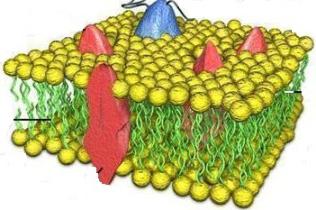The human body is a complex system, where each, even the smallest element, is assigned a role. In general, they all work in such a way as to ensure normal and long-lasting functioning of the organs. But sometimes unforeseen fatal failures occur, and some elements of the body begin to destroy others, thereby jeopardizing human health and life. Antibodies to phospholipids are a prime example.
Why phospholipids are needed

The human body consists of cells in the membrane of which phospholipids are necessarily present.
These structures are involved in the transport of fats and cholesterol, are solvents of hydrophobic substances. Phospholipid - what is it? From the point of view of organic chemistry, this is a complex compound of esters of polyhydric alcohols and fatty acids, which also has a phosphoric acid residue in the molecule. Figuratively, a hydrophobic tail is distinguished in them, trying to avoid touching the water, and a hydrophilic head, which is in excellent contact with water. This amphiphilicity is a very useful quality that determines why every phospholipid is so important to the body. What does it mean? Firstly, these substances dissolve cholesterol, supporting the plasticity of cell membranes, and “repair” them in case of deformation. Secondly, they affect blood coagulation, tissue regeneration. With a deficiency of phospholipids, damaged cells cannot recover, which leads to a number of diseases. In terms of their charge, these substances are positive, negative and neutral.
Antiphospholipid Syndrome
The disease occurs when antibodies to phospholipids begin to develop. This condition is called antiphospholipid syndrome (APS).
Causes of occurrence:
- infectious diseases;
- a side effect of taking psychotropic drugs and hormonal contraception;
- nodular periarteritis;
- oncological diseases;
- lupus erythematosus;
- AIDS;
- some vascular diseases;
- genetic predisposition.
Everyone knows how useful antibodies are. This is a special type of protein designed to save a person from various foreign objects: viruses, bacteria and other things. But sometimes they begin to work incorrectly and attack elements important to the body, destroying them and interfering with normal metabolism. In the case of phospholipids, mainly antibodies bind to negative species (cardiolipins and phosphatidylserines). They can also act on neutral phospholipid. What does this entail? One of the biggest annoyances is disruption of the membranes of platelets and cells in blood vessels. In this regard, there are:
- thrombosis;
- miscarriages and premature births;
- Fading of the fetus;
- diseases;
- heart problems, in particular strokes.
APS with a frequency of about 5 people per 100 is found in pregnant women and 3-4 people per hundred - in older people.
Symptoms
Unfortunately, sometimes patients do not even suspect that in their bodies antibodies instead of viruses and bacteria destroy vital substances such as phospholipid. What this happens, people learn only from analysis. Symptoms indicating the presence of APS can be as follows:
- the appearance of a vascular pattern on the body (especially often it appears on the hips and legs);
- decreased vision (since blood clots appear in the retina);
- protein in the urine;
- hypertension;
- renal failure;
- miscarriages and sudden freezing of a normally developing fetus;
- premature birth.
Diagnostics
Antibodies to cardiolipin are considered to be the main fraction of antibodies to phospholipids. What does this mean? Such antibodies come in several classes - IgM, IgA and IgG. In a small amount, they are always present in the human body. The detection of blood serum is considered the norm:
- IgG - up to 19 IU / ml;
- IgM - up to 10 IU / ml;
- IgA - up to 15 IU / ml.
Most often, laboratory tests show the presence of antibodies IgG (40-45%) and IgA (17-55%). The presence of serum IgM is less common (5-30%). The amount of these antibodies decreases significantly after treatment with APS. Their low rates are also observed in patients with syphilis, lupus erythematosus, arthritis (rheumatoid) and with Sjogren's syndrome.
A blood test is only given on an empty stomach. After the last meal, it should take from 8 to 12 hours.
Essential phospholipids - what is it
Essential phospholipids were named because of their importance and indispensability for the vital functions of cells. Nowadays, drugs are produced that include these substances. They are used in hepatology, cardiology, neurology. They have an excellent regenerative effect on the membranes of liver cells, since there are 65% of phospholipids in them. They are also used for:
- hepatitis;
- intoxication;
- atherosclerosis;
- heart ischemia;
- diseases of the gastrointestinal tract;
- toxicosis;
- skin diseases;
- exposures.
There is evidence that the use of essential phospholipids is also useful in diabetes mellitus.
The drug is available in capsules and in injection solutions. Apply the drug in combination with other drugs.